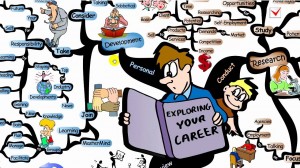 Your career map is your plan for career success. Without a map, it’s unlikely that you will reach your destination. And even if you do, you probably wasted a lot of time making circles or finding a lot of dead ends. To avoid making those mistakes in your career, you need to create your career plan.
Your career map is your plan for career success. Without a map, it’s unlikely that you will reach your destination. And even if you do, you probably wasted a lot of time making circles or finding a lot of dead ends. To avoid making those mistakes in your career, you need to create your career plan.
We have talked about the three components to writing a successful strategic career plan:
- Define your career aspirations
- Build your personal brand
- Develop a plan
This article will focus on how you have develop your plan. (For more information on this topic, Watch our Free Webinar: 3 Keys to Unlock YOUR Strategic Career Plan)
Before you get your pen and start writing your branding statement, it is important to identify any obstacles that could get in the way of writing or living your brand effectively. Obstacles could be:
- Fear of making a change.
- Procrastination (putting off finishing or implementing your career plan.)
- Uncertainty about your career direction. If you are uncertain about your career direction, you will be unable to write an effective branding statement. In this case, it would be helpful to spend some more time defining your career aspirations (link to first article in series).
If you find one of these obstacles is preventing you from creating your strategic career plan, take some time to journal about your feelings. And we are always available to help you in creating your career path. Speak with us today!
Remember, you need to be the CEO of your career! Ultimately, you are the only one in charge of your career path. This fact can help keep you motivated towards setting and reaching career goals.
Here are three action steps to take before you write your strategic career plan:
- Market your skills. This has to do with building your brand (link to second article on building brand). For example, develop a portfolio of your career-enhancing experiences and skills. Take calculated risks to get out of your comfort zone and advance your career.
- Create option value. Actively seek opportunities across your organization to open multiple career path options and build transferable skills.
- Optimize career-life fit. Think about the evolution of your career over time. Identifying how your job may change will allow you to prepare and stay ahead of the curve.
Now you are ready to start building your strategic career plan. There are three basic elements to an effective strategic career plan:
- One-year plan
- Three-year plan
- Five-year plan
When creating your strategic career plan, you will want to start with your five-year plan. This will allow you to start with your vision: your big-picture goals. From there you can work backwards to determine what smaller goals you need to reach.
Are you ready? Right now, write down where you want to be in five years from now. Now you can determine where you should be in three years and next year. And just like that, you have created your career map.
Like any journey, you need to check the map regularly to make sure you are on track. You will want to check and evaluate your strategic career plan quarterly. When checking your plan, ask yourself:
- Are my goals specific and reasonable?
- Am I on target?
- Do I need to make any adjustments?
You will need to push yourself to reach your goals. It can be scary to get out of your comfort zone. But remember that without risk, there is no reward. Hallie’s favorite quote is, “The greatest risk in life is not taking one.” She lives by this, and we want you to as well!
Speak with your mentor or a career coach for help with accountability or if you are feeling discouraged. Don’t be afraid to readjust your course if you find you consistently aren’t reaching your goals.You may just need to set a few smaller goals to help get you back on track.
“The greatest risk in life is not taking one.”


